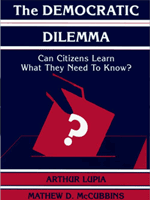Uninformed
2016
"Arthur Lupia poses a ground-breaking, accessible, and passionate challenge to conventional wisdom." --The Journal of Politics
"In this capstone work, ... Arthur Lupia synthesizes years of work with scientists and educators in all arenas to figure out how to increase issue competence among voters." The Telegraph (UK)
"Lupia presents solutions to improve the interaction and communication strategies of those who would seek to improve citizens' political knowledge..." --Science
"Rather than focusing on how an environmental regulation might slightly change the temperature on a polar ice cap, for example, [educators] should explain how it will save a local elementary school from ending up underwater. Once voters are hooked on a big-picture concept, it's easier to get them engaged..." --Time Magazine
"Lupia provides sightlines for educators to ... add new voices of reason...to our political discourse." --Science
"Lupia’s mantra, throughout the book, is that “we can do better.” Uninformed provides a foundation for scholars and educators alike to do precisely that." -- The Journal of Politics
2011
Cambridge Handbook of Experimental Political Science
This book provides the first comprehensive overview of how experimental research is transforming the study of politic. Some chapters explain and define core concepts in experimental design and analysis. Other chapters provide an intellectual history of the experimental movement. The book documents the growing influence of experimental political science.

Japanese Version - The Democratic Dilema
A Japanese version of "The Democratic Dilemma" was published in 2005 by Bokutakusha Press in Tokyo. Translation by Masahiro Yamada.
2005
2000
Elements of Reason
Many social scientists want to explain why people do what they do. A barrier to constructing such explanations used to be a lack of information on the relationship between cognition and choice. Now, recent advances in cognitive science, economics, political science, and psychology have clarified this relationship. In Elements of Reason, scholars from across the social sciences use these advances to uncover the cognitive foundations of social decision making. They answer tough questions about how people see and process information and provide new explanations of how basic human needs, the environment, and past experiences combine to affect human choices.
2007
Positive Changes in Political Science
Richard D. McKelvey was a pioneer in the use of mathematical modeling for understanding the nature of political choices. Positive Changes in Political Science brings together his most important articles, accompanied by original essays from contemporary political scientists, some his colleagues or students, who reflect upon his contributions, their continuing relevance today, and their impact on future research.
Stealing The Initiative
This book uses eleven recent California initiatives and referendums to provide readers with a set of analytical tools and examples that will help them better understand real politics. It clarifies the public consequences, and studies the great variations of what happens to initiatives that win on Election Day.
2001
1998
The Democratic Dilemma
Most citizens seem underinformed about politics. Many experts claim that only well-informed citizens can make good political decisions. Is this claim correct? The Democratic Dilemma combines insights from political science, economics, and the cognitive sciences to explain how citizens gather and use information. They show when citizens who lack information can (and cannot) make the same decisions they would have made if better informed. As a result, they clarify the debate about citizen competence.







